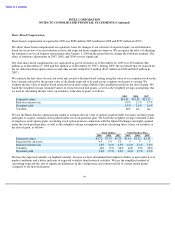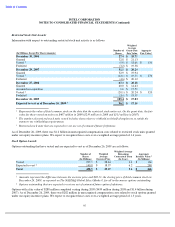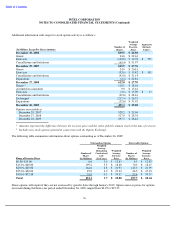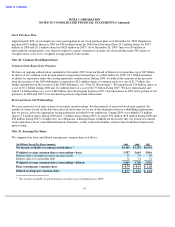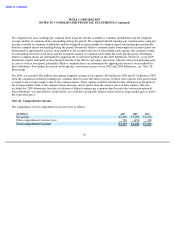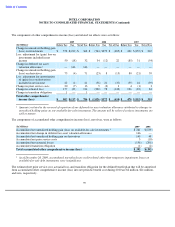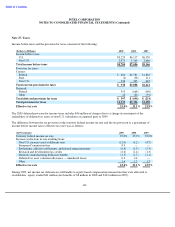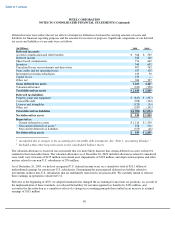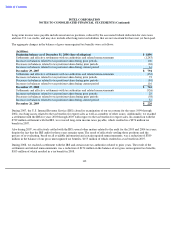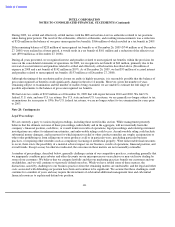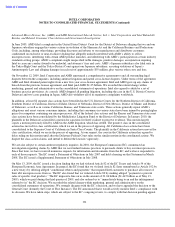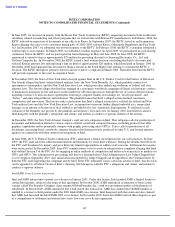Intel 2009 Annual Report Download - page 115
Download and view the complete annual report
Please find page 115 of the 2009 Intel annual report below. You can navigate through the pages in the report by either clicking on the pages listed below, or by using the keyword search tool below to find specific information within the annual report.
Table of Contents
INTEL CORPORATION
NOTES TO CONSOLIDATED FINANCIAL STATEMENTS (Continued)
Advanced Micro Devices, Inc. (AMD) and AMD International Sales & Service, Ltd. v. Intel Corporation and Intel Kabushiki
Kaisha, and Related Consumer Class Actions and Government Investigations
In June 2005, AMD filed a complaint in the United States District Court for the District of Delaware alleging that we and our
Japanese subsidiary engaged in various actions in violation of the Sherman Act and the California Business and Professions
Code, including, among other things, providing discounts and rebates to our manufacturer and distributor customers
conditioned on exclusive or near-exclusive dealing that allegedly unfairly interfered with AMD’s ability to sell its
microprocessors, interfering with certain AMD product launches, and interfering with AMD’s participation in certain industry
standards-setting groups. AMD’s complaint sought unspecified treble damages, punitive damages, an injunction requiring
Intel to cease any conduct found to be unlawful, and attorneys’ fees and costs. AMD’s Japanese subsidiary also filed suits in
the Tokyo High Court and the Tokyo District Court against our Japanese subsidiary, asserting violations of Japan’s
Antimonopoly Law and alleging damages in each suit of approximately $55 million, plus various other costs and fees.
On November 12, 2009, Intel Corporation and AMD announced a comprehensive agreement to end all outstanding legal
disputes between the companies, including antitrust litigation and patent cross-license disputes. Under terms of the agreement,
AMD and Intel obtained patent rights from a new five-year cross-license agreement, Intel and AMD gave up any claims of
breach from the previous license agreement, and Intel paid AMD $1.25 billion. We recorded the related charge within
marketing, general and administrative on the consolidated statements of operations. Intel also agreed to abide by a set of
business practice provisions. As a result, AMD dropped all pending litigation, including the case in the U.S. District Court in
Delaware and two cases pending in Japan. AMD also withdrew all of its regulatory complaints worldwide.
In addition, at least 82 separate class actions have been filed in the U.S. District Courts for the Northern District of California,
Southern District of California, District of Idaho, District of Nebraska, District of New Mexico, District of Maine, and District
of Delaware, as well as in various California, Kansas, and Tennessee state courts. These actions generally repeat AMD’s
allegations and assert various consumer injuries, including that consumers in various states have been injured by paying higher
prices for computers containing our microprocessors. All of the federal class actions and the Kansas and Tennessee state court
class actions have been consolidated by the Multidistrict Litigation Panel to the District of Delaware. In January 2010, the
plaintiffs in the Delaware action filed a motion for sanctions for Intel’s failure to preserve evidence. This motion largely
copies a motion previously filed by AMD in the AMD litigation, which has settled. The putative class in the coordinated
actions has moved for class certification, which we are in the process of opposing. All California class actions have been
consolidated to the Superior Court of California in Santa Clara County. The plaintiffs in the California actions have moved for
class certification, which we are in the process of opposing. At our request, the court in the California actions has agreed to
delay ruling on this motion until after the Delaware Federal Court rules on the similar motion in the coordinated actions. We
dispute the class-action claims, and intend to defend the lawsuits vigorously.
We are also subject to certain antitrust regulatory inquiries. In 2001, the European Commission (EC) commenced an
investigation regarding claims by AMD that we used unfair business practices to persuade clients to buy our microprocessors.
Since that time, we have received numerous requests for information and documents from the EC, and we have responded to
each of those requests. The EC issued a Statement of Objections in July 2007 and held a hearing on that Statement in March
2008. The EC issued a Supplemental Statement of Objections in July 2008.
On May 13, 2009, the EC issued a decision finding that we had violated Article 82 of the EC Treaty and Article 54 of the
European Economic Area Agreement. In general, the EC found that we violated Article 82 (later renumbered as Article 102 by
a new treaty) by offering alleged “conditional rebates and payments” that required Intel customers to purchase all or most of
their x86 microprocessors from us. The EC also found that we violated Article 82 by making alleged “payments to prevent
sales of specific rival products.” The EC imposed a fine on us in the amount of €1.06 billion ($1.447 billion as of May 13,
2009), which we paid during the third quarter of 2009, and also ordered us to “immediately bring to an end the infringement
referred to in” the EC decision. We recorded the related charge within marketing, general and administrative on the
consolidated statements of operations. We strongly disagree with the EC’s decision, and we have appealed the decision to the
General Court (formerly the Court of First Instance). The EC announced that it would actively monitor Intel’
s compliance with
its decision. We have taken steps, which are subject to the EC’s ongoing review, to comply with that decision pending appeal.
104


